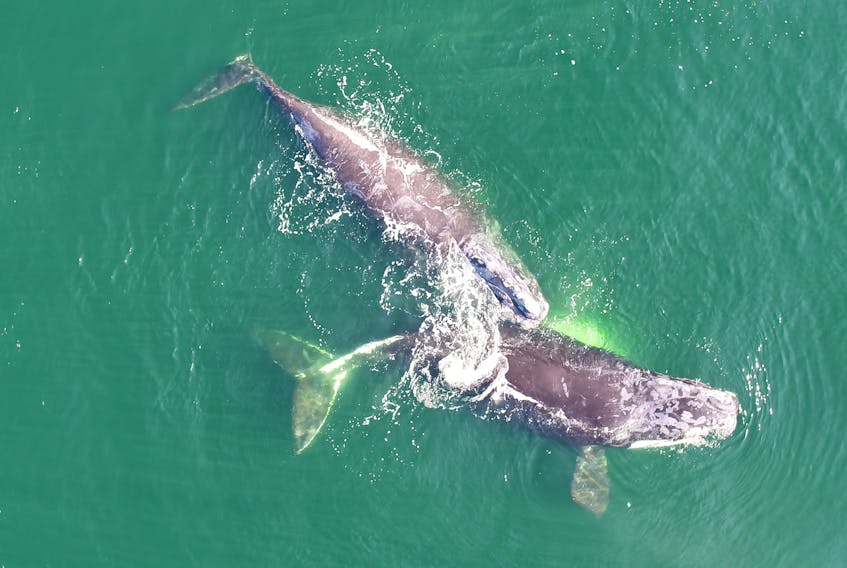The North Atlantic right whale is endangered. According to the latest IUCN report, this population has even been classified as critically endangered. Unfortunately, this means that the causes of whale mortalities are beyond the whales' ability to reproduce and survive. In the case of the right whale, almost all deaths are due to human activities. It is not easy to see this population of giants of the sea become extinct, and yes, it is sad. Perhaps it's because it hits us so hard that we feel the need to point the finger at the culprits. This is even more true for the media, who rush to get answers, right away.
If we are too eager to know whose fault it is, we end up taking dangerous, even tendentious, shortcuts to find the culprits at all costs. An example from my own experience a few weeks ago: after commenting on the release of a report on whale deaths in 2019, I was falsely told that I was "pointing out that one of the greatest dangers for whales is the wire that connects lobster or crab traps to a surface buoy.” I was commenting on a report that states that all right whale necropsies in 2019 reveal deaths caused by ship strikes, not entanglement in fishing gear. As too often, the article in question used fishermen as easy targets for a gratuitous accusation in the circumstances.
When a whale is hit by a shipping vessel, it either gets injured or dies. To observers, no matter how experienced they are, a whale with a fracture doesn't look injured. If it doesn't die, there is no way to blame the ships (and most of these big vessels don't even notice if they hit a whale). If it does die, it will either sink to the bottom and never be found; or if it is found, it is only at a necropsy that we will see the clues that lead to the conclusion that it died from a ship strike. If we play the game of "whose fault is it," only in this way will we be able to place the shipping vessels among the guilty parties.
In the dock are also the fishermen, for whom blame is almost automatic. When a whale interacts with fishing gear, it shows. Both the fisherman who loses his equipment and the observers who see either the remaining ropes or the scars they have left. A whale that survives an entanglement can automatically be identified as a victim of fishermen for several years, and the fishermen blamed. If it dies, again showing its marks, a necropsy may not even be necessary to once again blame the fishermen for its death.
For a media that is in a hurry to get its news out and takes shortcuts, this disparity creates a serious problem: it is almost always the fishermen's fault. Perhaps they are easier to blame because they are real people, not technical entities like vessels. We get a culprit faster.
The same goes for the recently released IUCN Critically Endangered Species publication. It presents the statistics for 2018, where it talks about a little over 400 remaining right whales, the same data that has been mentioned since 2017. It also mentions 250 mature individuals (again, this is not new information). For some media, the "250 whales" was incorrectly used in the headlines as if it were a new estimate of the remaining population. If you look for scandals too much, you end up finding them.
Again, it's the fishermen's fault. All the efforts made by fishers over the past two years to improve our chances of coexisting with the whales in the gulf have been too often ignored. By doing so, we are shooting ourselves in the foot and that is not helping the whales at all. In fact, since 2019 and despite the damning incident report, none of the whales found dead seem to be attributable to fishers. Following the 2020 snow crab fishing season, no entanglements or deaths have been reported. On the fringes of this, hundreds are on the front lines, funding research and development of solutions, or risking their lives on whale rescue boats. Unfortunately, this is something that is not widely reported in the media.
The part of my message about whale conservation that is too often overlooked is that it is through collaboration that we can make a significant difference, change the course of things for whales. We don't have a lot of time left, so we need to be all the more effective and work hand in hand, not against each other. Instead of wondering whose fault it is, we should stay focused on solutions and hope to survive, to coexist, to be able to say "thanks to whom."
Lyne Morissette, PhD, is a Canadian ecologist specializing in ocean conservation, endangered species, marine mammals and ecosystem functioning. This opinion piece is sponsored by the P.E.I. Snow Crab Fishermen's Association and the P.E.I. Fishermen's Association, among other fishing groups.









